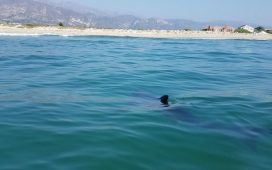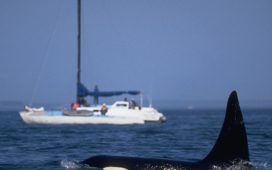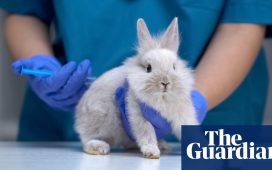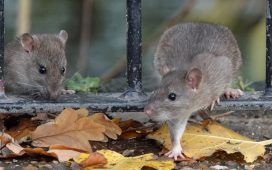Warning: Distressing images
So many dolphins were slaughtered in the Faroe Islands over the weekend some of their fat is being sent off for incineration, according to reports.
Hunters on the island of Skálafjørðuras were behind an unprecedented massacre on Sunday evening, which saw 1,428 white-sided dolphins butchered.
The century-old traditional Grindadrap hunt sees the creatures – and pilot whales – driven towards the shore for hours by people using jet-skis and boats before being sliced in their necks.
Not only do animal rights activists say the practice is cruel and unnecessary, they also point out that an assessment of how many white-sided dolphins live in the region is yet to be made.
Even some whalers were said to be dead against Sunday’s event, due to the sheer number of dolphins killed, suggesting far more meat has been left behind than locals need.
Hunters will make use of pilot whales’ blubber, but according to Faroese media reports, dolphin fat is not as valued as it isn’t as high in measure.
Dolphin carcasses are often dumped back into the sea, but the same can’t be done for blubber as it floats and could just be washed back onto shore.
Local authorities are now said to be in touch with the IRF, a Faroese waste company, to send the fat of for incineration.
Chief operating officer of non-profit Sea Shepherd, Rob Read, told Metro.co.uk: ‘They have been putting it in an incineration plant and they have been quite open about that because it’s in the Faroese press right now.
‘They’re literally just taking it in a garbage disposal truck. It’s caused such an outrage in the Faroe Islands even among whalers.’
Locals have also reported that so much meat has been produced it has been sent to other parts of the country, and he suspects much of it will end up wasted.
‘I suspect over years to come is we’ll probably start seeing dolphin meat appearing in bins all over the islands,’ Mr Read added.
To put Sunday’s hunt into perspective, the second largest hunt in the Faroe Islands on record was in 1940, when 1,200 pilot whales were killed in one day.
The Faroese usually kill around 1,000 mammals in this way over the summer months.
While it is part of the Kingdom of Denmark, the Faroe Islands is an autonomous country and is outside the EU.
If the North Atlantic nation were inside the bloc, then Grindadrap would be illegal under its animal welfare standards.
Despite the outrage of Sunday’s hunt, the territory’s government sough to defend it.
Yesterday a spokesman told Metro.co.uk: ‘The commonly occurring pilot whales are taken for their meat and blubber in whale drives which are organised on the community level and regulated by national legislation and regulations.
‘White-sided dolphins are also a commonly occurring and abundant species around the Faroe Islands.
‘Individual animals occasionally occur together with schools of pilot whales, while separate schools are also sometimes driven and beached, and fully utilised for human consumption.
‘The driving and killing of dolphins in the Faroe Islands must be carried out according to the same regulations which apply to pilot whales.
‘The Faroe Islanders catch on average annually approximately 250 White-sided dolphins.
‘But as with pilot whales the number fluctuates greatly from year to year. The catch on Sunday was exceptionally large. The Faroese take on average 800 pilot whales annually.
‘Pilot whales and other small whales are utilised for food in the Faroe Islands and represent one of few local sources of meat that does not have to be imported from afar.
‘The meat from each whale drive provide a large amount of valuable food, which is distributed free in the local communities where the whale drives take place, food that would otherwise have to be imported from sources in other countries.
‘There is no doubt that the Faroese whale hunts are a dramatic sight to people unfamiliar to the hunts and slaughter of mammals. The hunts are, nevertheless, well organised and fully regulated.’
The Faroese government declined to comment on dolphin blubber being incinerated.
A Defra spokesperson said: ‘The UK is strongly opposed to the hunting of any cetaceans and continues to call on all whaling nations, including the Faroe Islands, at every appropriate opportunity to cease their whaling activities in favour of well-managed, responsible tourism, such as whale-watching.
‘We recognise there is a long tradition in the Faroe Islands of killing certain cetaceans for meat and other products and we wish to continue our frank conversations relating to cetacean conservation to encourage them to stop these hunts.’
Get in touch with our news team by emailing us at webnews@metro.co.uk.
For more stories like this, check our news page.
















